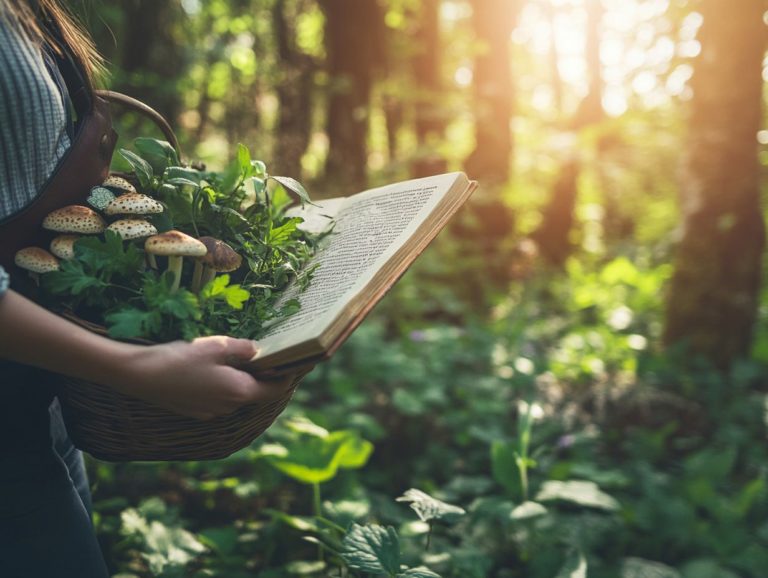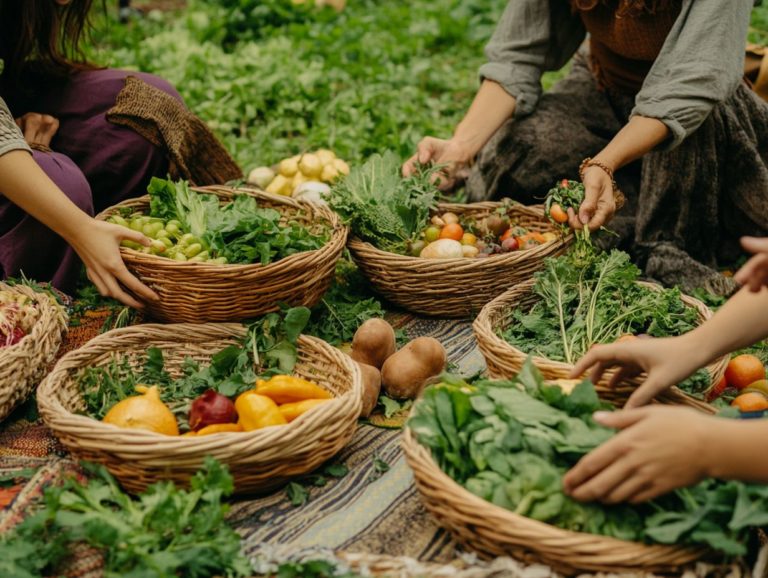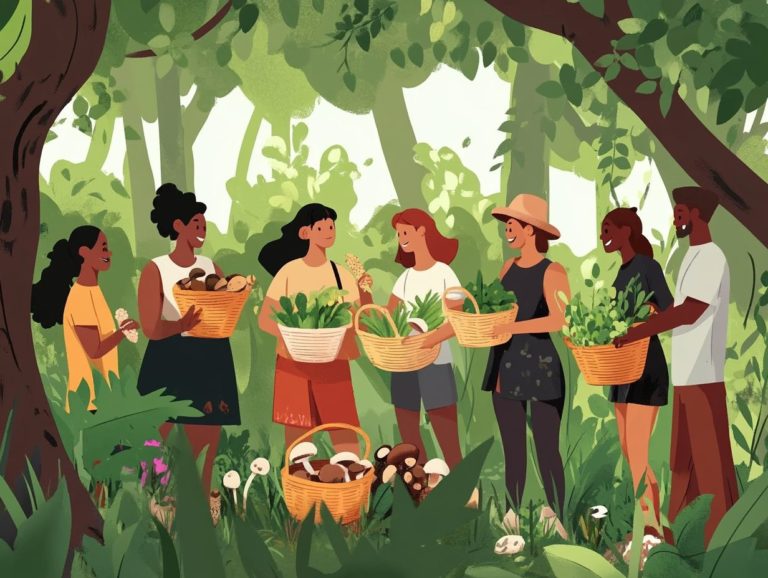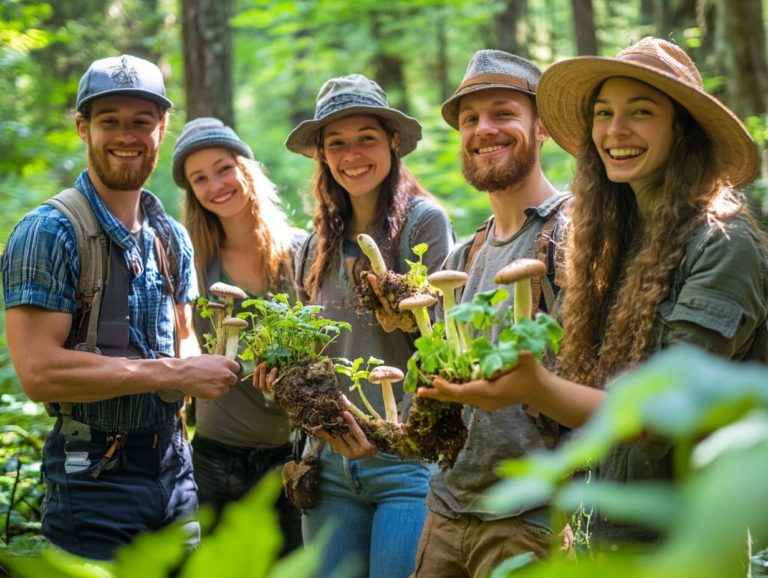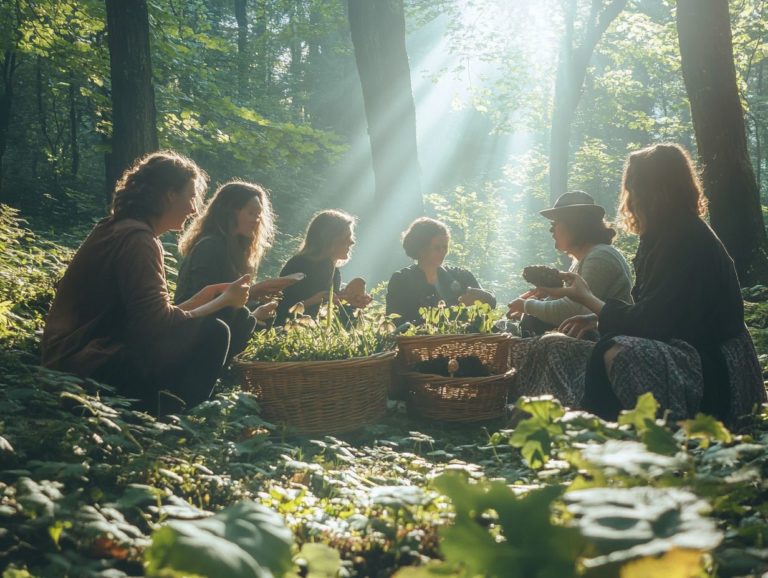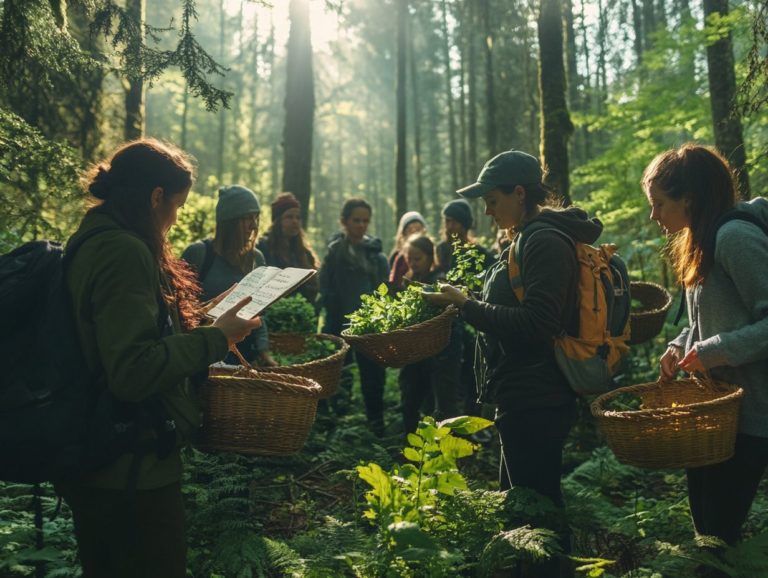Building Connections with Foraging Organizations
Foraging, the practice of collecting wild food, transcends the mere act of locating edible plants and mushrooms; it serves as a profound pathway to forge meaningful connections with nature and fellow enthusiasts.
By joining foraging organizations, you unlock a treasure trove of benefits, from community support and knowledge sharing to access to exclusive resources and events tailored just for you.
Whether you seek to refine your skills, volunteer your time, or simply connect with like-minded individuals, this guide is your key to discovering local foraging groups and contributing to sustainable communities.
Dive into the world of foraging and discover the vibrant connections it fosters!
- Key Takeaways:
- Benefits of Joining Foraging Organizations
- How to Find and Connect with Foraging Organizations
- Contributing to Foraging Organizations
- Building Connections through Foraging
- Frequently Asked Questions
- Curious about foraging organizations? Here s what you need to know!
- How can I find foraging organizations in my local area?
- What are some benefits of building connections with foraging organizations?
- Can I still benefit from foraging organizations if I am new to foraging?
- How can I contribute to foraging organizations and their communities?
- Are there any potential challenges when building connections with foraging organizations?
- Joining foraging organizations provides a sense of community and opportunities to share knowledge with like-minded individuals.
- Find and connect with foraging organizations through online resources and local events, such as meetups and foraging workshops.
- Contribute to foraging organizations through volunteering, donating, and sharing knowledge and skills to help build sustainable communities.
Contents
Key Takeaways:
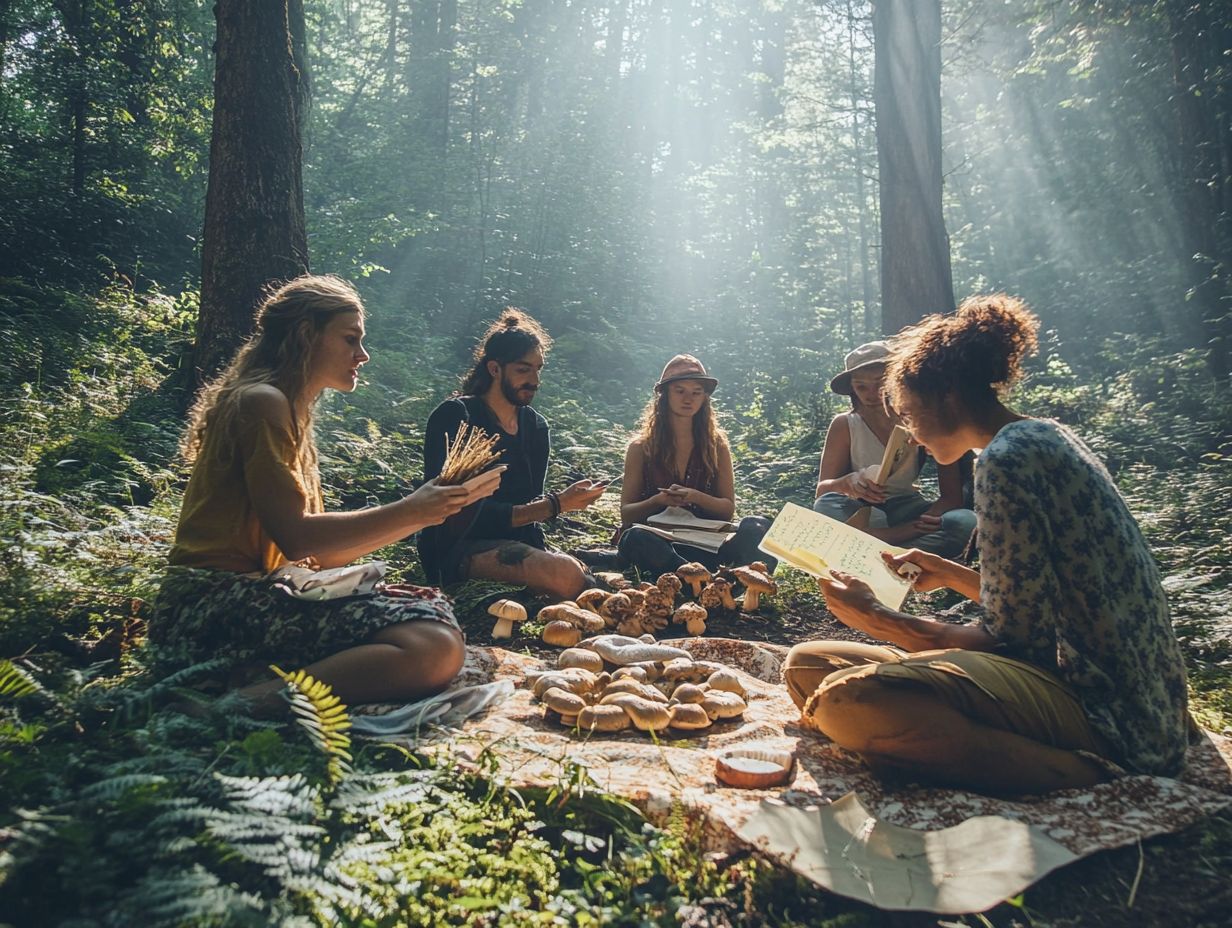
What is Foraging?
Foraging is the practice of seeking out and gathering wild foods, allowing you to connect with ancestral traditions and the natural world. This ancient practice, steeped in Indigenous wisdom and cultural healing, involves foraging for wild edibles like mushrooms, herbs, and berries. Not only do these treasures enrich your local diet, but they also bolster sustainability in food systems.
As you immerse yourself in these time-honored practices, you deepen your understanding of ecological knowledge and plant awareness, fostering a meaningful connection to nature and enhancing your control over your own food sources.
Engaging in foraging cultivates a conscious relationship with the environment, as you learn to recognize seasonal changes and appreciate the delicate balance within ecosystems. This profound interaction with nature can significantly elevate your mental health, offering therapeutic experiences that alleviate stress and promote mindfulness.
The communal aspect of foraging strengthens social bonds, encouraging collaboration among community members who share their knowledge and resources. This not only reinforces cultural heritage but also enriches your shared experience. By weaving foraging into your modern lifestyle, you reclaim agency over your food sources and contribute to a healthier, more resilient community rooted in sustainable practices.
Benefits of Joining Foraging Organizations
Joining foraging organizations opens up exciting opportunities, from deepening your community connections to gaining access to invaluable environmental education and resources, including connecting with foragers in urban areas that bolster food security.
These groups focus on sustainability and support for BIPOC foragers, creating an inviting space for exploration of ancestral traditions and appreciation of the ecological advantages of wild harvesting.
By participating in workshops and events hosted by these communities, you ll have the opportunity to share knowledge through storytelling and cultivate skills that enable you toward self-sufficiency and food justice.
Join a local foraging group today and start your journey toward sustainable living!
Community and Knowledge Sharing
Community and knowledge sharing form the backbone of foraging organizations. They create spaces for you to connect through shared experiences and Indigenous cultural practices, including how to use technology for foraging connections.
Collaborating and exchanging ideas with both BIPOC (Black, Indigenous, People of Color) and non-BIPOC foragers deepens your understanding of traditional methods. This enhances your awareness of wild foods and their ecological benefits, which are the positive effects on the environment.
This communal approach fosters a sense of belonging and enables you to reclaim ancestral knowledge while promoting food sovereignty within your community.
These collaborations often lead to workshops and gatherings where you can learn from one another. You will share invaluable ecological wisdom passed down through generations. Such activities enrich your understanding of local ecosystems and their intricate interdependencies.
Engaging in foraging together nurtures a deeper connection to the land and can be enhanced by building a network for new foragers. This reinforces sustainable practices that honor traditional uses of resources.
By gathering insights from diverse perspectives, you cultivate resilience and adaptability in addressing modern challenges. This ultimately creates a vibrant network that thrives on mutual support and shared wisdom.
Access to Resources and Events
Accessing resources and events is one of the standout advantages of joining foraging organizations. This allows you to participate in workshops and outdoor education programs that enhance your understanding of wild foods.
By attending these gatherings, you immerse yourself in the rich knowledge of edible plants and fungi. You also connect with fellow enthusiasts who share your passion.
Many organizations highlight the importance of cultural heritage. They offer sessions that delve into traditional foraging practices and their impact on community resilience.
These workshops spark vital discussions on environmental justice, illuminating how equitable access to natural resources can empower marginalized communities. This holistic approach ignites your passion for stewardship, inspiring you to advocate for sustainable practices and protect local ecosystems while enhancing your appreciation for the land.
How to Find and Connect with Foraging Organizations
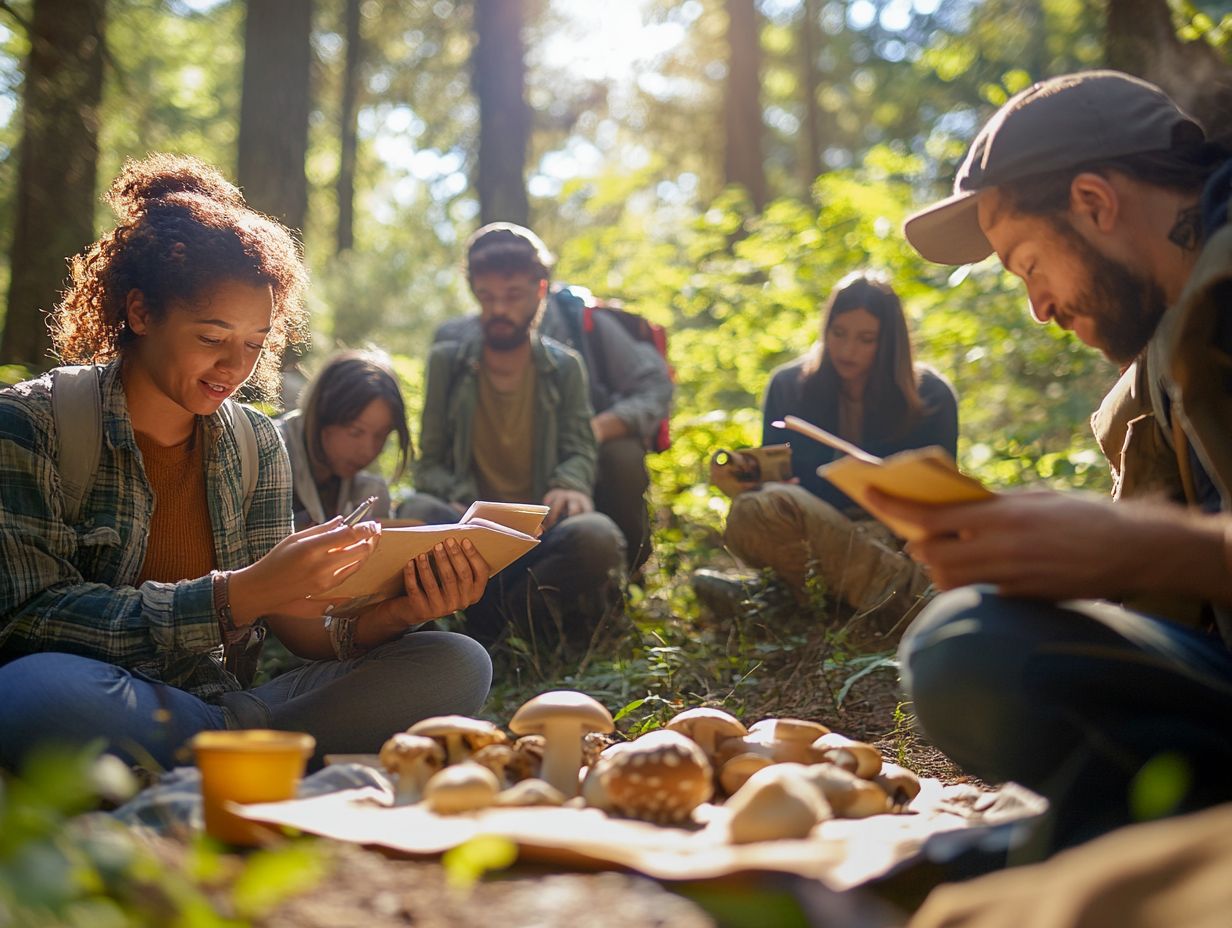
Embarking on the journey of finding and connecting with foraging organizations can be an enriching experience for you. It opens the door to engaging with nature and your community through local events and workshops, and you can explore more about this in the building a foraging network.
Many organizations are devoted to promoting foraging practices and helping you forge meaningful connections with the environment. This makes it easier for you to discover community gardens, attend foraging events, and access a wealth of online resources that offer valuable insights into wild edibles and sustainable practices, including how to build a foraging community.
By reaching out to these organizations, you can deepen your connection to nature and enhance your understanding of ecological knowledge.
Online Resources and Directories
Online resources and directories are essential for connecting you with foraging organizations and communities. They provide a wealth of information on sustainable practices and food justice.
Numerous websites and platforms curate lists of local foraging groups, workshops, and educational materials. These are designed to deepen your understanding of wild foods, ecological knowledge, and Indigenous practices.
By tapping into these resources, you can discover community events and explore the myriad ways wild edibles can enrich your local diet and food systems.
These platforms not only connect you with seasoned foragers but also underscore the vital importance of sustainable harvesting techniques that safeguard local ecosystems. They champion food justice by advocating for equitable access to foraged foods, aligning with broader environmental and social sustainability goals.
Many directories offer reviews and testimonials, guiding you toward reputable organizations that positively impact your community. As awareness of the benefits of foraging continues to grow, these online tools become invaluable allies, steering you toward a deeper appreciation of nature and the principles of food sovereignty.
Join a foraging group today and reconnect with nature!
Local Events and Meetups
Attending local events and meetups provides an excellent opportunity for you to connect with foraging organizations and foster a sense of community rooted in shared passions for wild foods and environmental education, including the connection between foraging and local ecosystems.
These gatherings unite individuals enthusiastic about nature and create a unique platform for exchanging valuable knowledge and experiences. Workshops often highlight the importance of the variety of plants and animals and responsible foraging practices, inspiring a deeper appreciation for local ecosystems.
Get ready to discover exciting new foraging techniques and learn how you can positively impact your environment. Local meetups act as a bridge, bringing together like-minded individuals eager to promote sustainability and taking care of our environment within their communities.
These interactions lay a solid foundation for a vibrant community devoted to preserving the environment while enjoying the myriad benefits of wild foods.
Contributing to Foraging Organizations
Contributing to foraging organizations offers you a unique opportunity to actively engage in community building while enhancing food security in your local environment. Whether you’re volunteering your time, sharing valuable knowledge and skills, or donating resources, your involvement makes a big impact in supporting the organization s mission and promoting sustainable practices.
By making these contributions, you not only enrich your own foraging experiences but also help cultivate a culture of collaboration, resilience, and ecological awareness within your community. Get involved today and make a difference!
Volunteering and Donating
Volunteering and donating serve as powerful avenues for you to support foraging organizations and advance their mission of promoting environmental education and food justice, including the integration of traditional practices and Indigenous knowledge. Many of these organizations depend on the commitment of dedicated volunteers like you to organize events, lead foraging workshops, and manage community gardens.
Donations play a crucial role in sustaining their initiatives and outreach programs. By investing your time or resources, you enhance your own understanding of wild foods and ancestral foods while strengthening community connections and advocating for ecological health.
These opportunities foster personal growth while creating a ripple effect that benefits the wider community. Local foraging organizations frequently hold educational sessions that teach participants how to identify edible plants and wild edibles and practice sustainable harvesting.
Through workshops and volunteer days, you can connect with like-minded individuals and experts, deepening your appreciation for nature’s bounty. Financial support can propel initiatives that expand access to fresh, local foods, particularly in underserved areas and among BIPOC foragers.
Together, your contributions cultivate a culture of stewardship, nurturing a vibrant and knowledgeable community dedicated to preserving natural resources and promoting food equity.
Sharing Knowledge and Skills
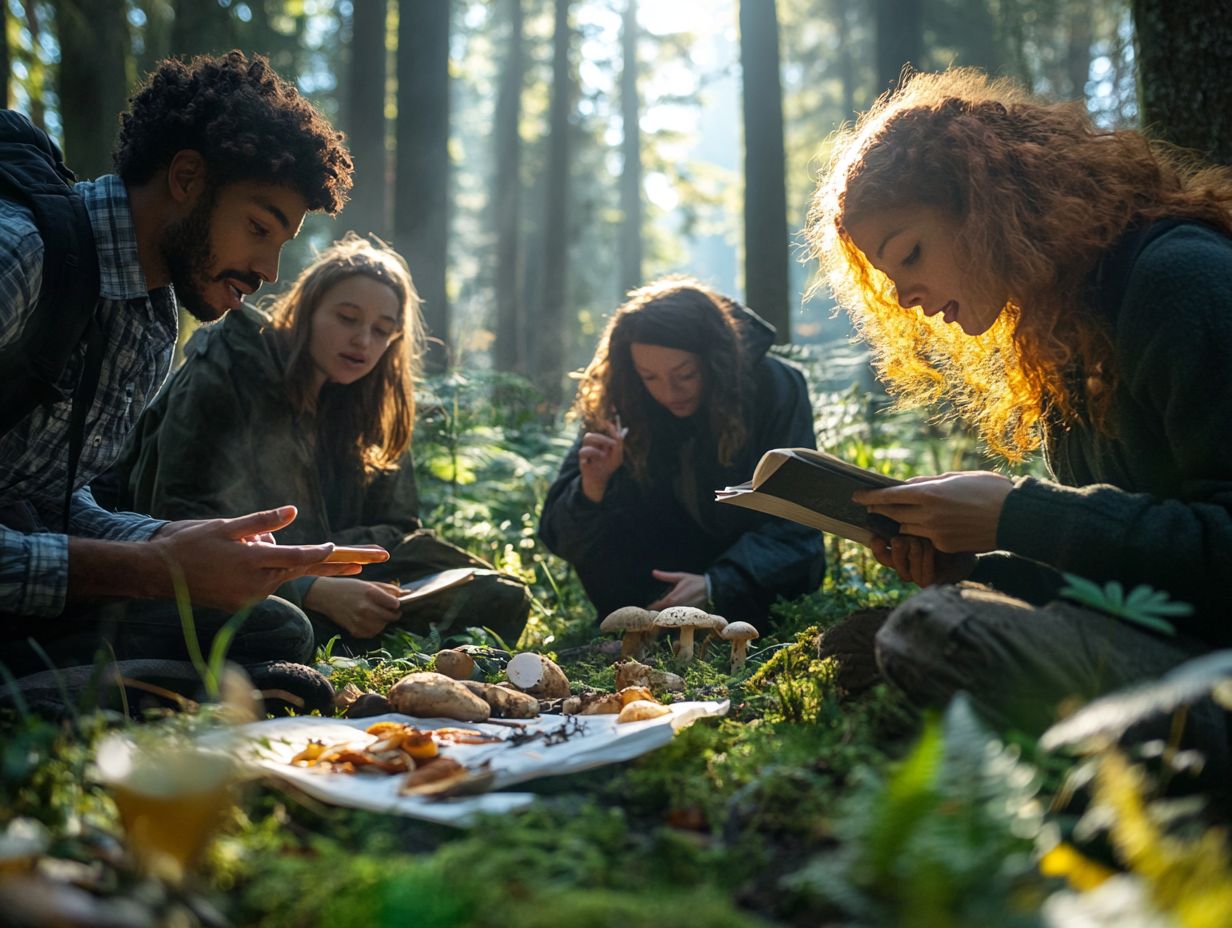
Sharing knowledge and skills is essential for anyone looking to contribute meaningfully to foraging organizations. It creates a collaborative atmosphere where you can learn from others about wild foods, sustainable practices, and ecological insights.
When you gather with fellow foragers to exchange experiences and techniques, you deepen your understanding of local ecosystems, sharpening your ability to identify edible plants and mushrooms while also exploring the ecological benefits of diverse foraging practices.
This collective effort leads to a more diverse and sustainable food source while fostering a greater appreciation for biodiversity within your community. As these initiatives flourish, they encourage local stewardship and promote responsible foraging behaviors that benefit both you and the environment.
Ultimately, as you engage in this ongoing learning process, you become a more enabled advocate for conservation and sustainability, ensuring that valuable ecological knowledge is preserved and passed down through generations.
Building Connections through Foraging
Building connections through foraging offers a remarkable opportunity to cultivate community and deepen your relationship with nature, cultural healing, and social change while addressing nature deficit disorder (the lack of time spent in nature, contributing to mental health issues). When you join others in exploring wild foods and ecological knowledge, you can learn best practices for connecting with other foragers, forging bonds that transcend cultural and generational divides. This fosters a shared understanding of food systems and the critical importance of sustainability.
These connections also strengthen community relationships, enabling communities to champion food justice and resource management. They underscore the vital role of collective action in driving social change.
Connecting with Nature and Others
Connecting with nature and others through foraging can be a transformative experience that significantly enhances your mental health, particularly through nature therapy, and fosters a sense of well-being. As you participate in community events, you engage in outdoor education that promotes plant awareness while strengthening your connection to the natural world.
This activity serves as a therapeutic escape from the daily grind. Embrace this practice watch your anxiety melt away! The shared experience deepens your appreciation for ecological knowledge and cultivates lasting relationships with fellow foragers, nurturing a collective commitment to sustainability.
The act of foraging invites mindfulness into your life, encouraging you to focus on the present moment while you explore your surroundings. This practice can significantly reduce anxiety and elevate your mood by directing your attention away from negative thought cycles.
When you engage in group foraging activities, you also cultivate a sense of belonging, which fosters community building and reinforces food culture. As you share stories, tips, and experiences with others, you help foster a supportive community. Collaborating to identify edible plants amplifies the joy of discovery, reinforcing the idea that nature nourishes not only the body but also the mind and spirit.
Creating Sustainable Communities
Creating sustainable communities through foraging invites you to engage in practices that enhance ecological health and resilience within local food systems. Foraging organizations emphasize the importance of resource management, environmental education, and establishing community gardens as essential means to foster self-sufficiency and food sovereignty, integrating Indigenous foraging practices and knowledge.
By encouraging you to reconnect with ancestral traditions and wild foods, these organizations cultivate a culture of sustainability that benefits not just individuals but the entire community.
This connection enriches your understanding of native flora and fauna while encouraging stewardship of local ecosystems. You often discover the significance of biodiversity and how foraging complements community gardens crucial hubs for sharing resources and skills, where urban foraging practices can thrive. These gardens don t just deliver fresh produce; they serve as gathering spaces where community members collaborate on diverse initiatives, strengthening social ties.
Through workshops and shared experiences in these vibrant green spaces, you gain valuable insights into sustainable agricultural practices and traditional practices, ultimately contributing to resilient food systems capable of withstanding economic and environmental challenges.
Frequently Asked Questions
Curious about foraging organizations? Here s what you need to know!
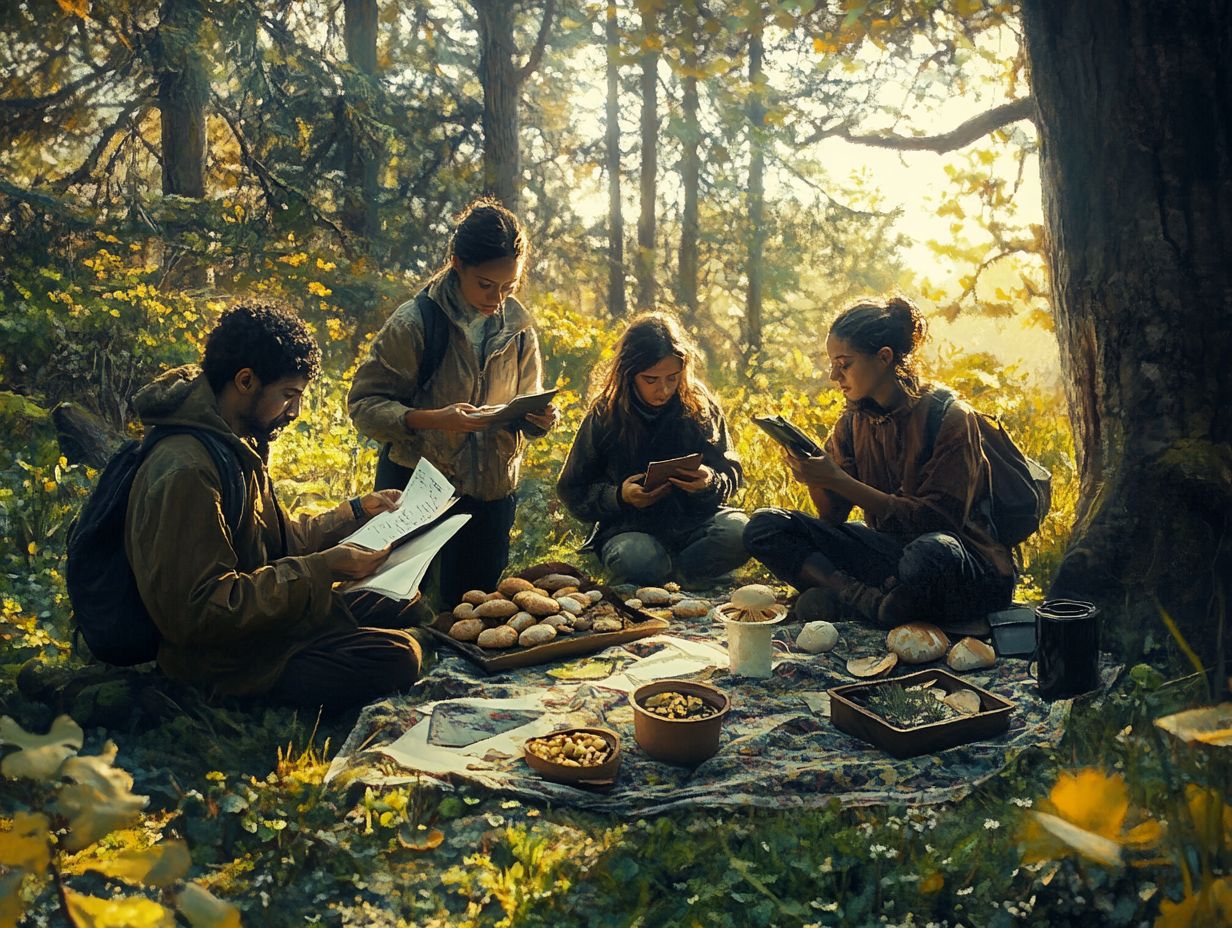
Foraging organizations are groups or communities of people who gather and harvest wild foods and resources from their surrounding environment. Building connections with these organizations is important because it allows for the sharing of knowledge, resources, and support for sustainable foraging practices.
How can I find foraging organizations in my local area?
One way to find foraging organizations in your local area is to search online for groups or forums dedicated to foraging. You can also attend events or workshops related to foraging and connect with other participants who may be part of foraging organizations.
Join a local foraging group or attend an upcoming event to start your journey into the world of foraging!
What are some benefits of building connections with foraging organizations?
Building connections with local foraging groups opens doors to new areas and techniques. You’ll also join a friendly group of people who are passionate about sustainable foraging practices.
Can I still benefit from foraging organizations if I am new to foraging?
Absolutely! Foraging organizations welcome everyone, regardless of experience. They offer valuable resources and support for beginners eager to learn.
How can I contribute to foraging organizations and their communities?
You can contribute in various ways. Share your knowledge, volunteer at events, or donate resources to support their initiatives.
Are there any potential challenges when building connections with foraging organizations?
Like any community, challenges may arise in forming connections. Embrace these opportunities with respect and a willingness to learn for a fruitful experience.

